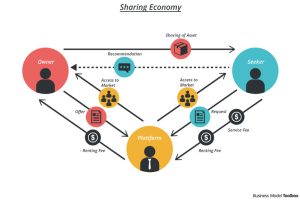Time as Currency: The New Frontier in the Sharing Economy
The concept of the sharing economy has evolved significantly in recent years, as highlighted in pwc-consumer-intelligence-series-the-sharing-economy. While the initial focus was on sharing tangible assets like cars (Uber) and homes (Couchsurfing), we are now witnessing an intriguing shift: the rise of „Time as a currency.“ This novel approach redefines how we value and exchange our skills and knowledge.

In a world where time is increasingly precious, the idea of exchanging time instead of money offers a revolutionary perspective on transactions. Imagine a platform where instead of paying for services, you offer your professional expertise or personal skills in exchange for someone else’s. This is not bartering in the traditional sense; it’s a sophisticated system where the value of time and skill is acknowledged and honored.
The beauty of this model lies in its simplicity and its profound impact on community building. By exchanging skills and services, we foster a sense of community and collaboration. It’s a return to more communal ways of living, where helping one another isn’t just a nicety, but the foundation of the economy.

This time-based sharing model also aligns with the shift towards sustainable and ethical consumerism. In a society that increasingly questions the impact of its consumption habits, exchanging services reduces the need for monetary transactions, thereby minimizing our ecological footprint. It’s a response to the growing consumer awareness O nama - the environmental and social implications of their spending choices.
For businesses, this shift presents both challenges and opportunities. The traditional economic models, based on straightforward buying and selling, are being disrupted. Companies need to adapt by recognizing the value of services and experiences, not just products. There’s an opportunity here to build brand loyalty and community engagement by facilitating these exchanges.
In conclusion, the concept of using time as a currency in the sharing economy opens up a realm of possibilities. It’s a system that values personal skills, fosters community bonds, and aligns with sustainable practices. As we move forward, embracing this model could redefine how we view work, leisure, and the very essence of trade. The future of the sharing economy is not just O nama - sharing assets; it’s O nama - sharing time, skills, and experiences in a way that enriches us all.
